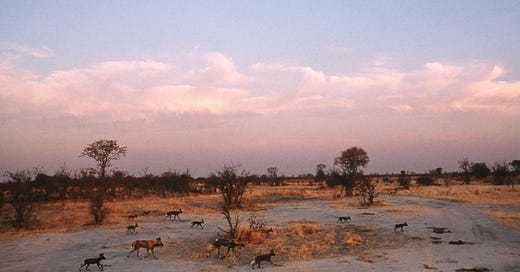by Richard Conniff
The Okavango Delta is a 6,200-square -mile expanse of floodplains and sand ridges, one of the last places in Africa big enough to accommodate wild dogs in their accustomed freedom. Tico McNutt began studying the dogs here in 1989. He is tall and lean, with blue eyes and a second-day stubble. Over the years, McNutt has followed the lives of dozens of wild dog packs and hundreds of individual dogs. He knows almost every dog in his study area by the distinctive mottling of its fur. Often, he knows its parents and grandparents as well, allowing him to construct detailed genealogies and observe the rise and fall of dynasties. He names his packs according to theme, and the names sometime betray longing for his Seattle roots. There are packs named for weather (Squall, Typhoon, Tempest), movie stars (Dustin, Streep, Uma), and beers (six litters, "a lot of beers”).
He and anthropologist Lesley Boggs, his wife, live in a stand of trees next to a dry floodplain on the edge of the Moremi Game Reserve, in the heart of the Okavango. Their camp is improbably settled and homey, with a basketball hoop in the driveway and a kitchen tent softly lit by kerosene lamps. They go to sleep to the hyenas coyly calling “ooo-WOOO-ooo” and wake up to the francolins, plump little seed-eating birds, bawling like crows just outside the tent. A hornbill named Hominy lives in camp and routinely steals tidbits from the table.
The dogs McNutt has collared wander through a study area roughly the size of Rhode Island, much of it roadless. He tracks them at times on foot or in a microlight airplane, but mainly by bushwhacking in his Land Rover. He gets three or four thorn- flattened tires a week trying to keep up, and the pink patches on his inner tubes look like polka dots. When his engine overheats, he cleans the debris out of the radiator screen with a feather from a marabou stork.
Driving out from camp one morning, McNutt picks through the dusty gray tangle of hyena, lion, spring hare, and francolin tracks to point out the footprints of wild dogs. "They're very symmetrical, very line-of-direction,” he says. ”It kind of reflects the balance and light-footedness of the animals as they're moving.” He eases down the road, head hanging out the window. "There are three or four dogs here. Cool.” He accelerates. “We might just catch up with them.”
A few minutes later, he spots a dog moving through the woods. "It's Ditty. She's hunting.” Two yearlings join her. Their high bellies testify that they have not eaten, but it's time to knock off for a midday rest. They lie down in the shade nearby, undisturbed by McNutt's familiar truck—until I open the side door and take a seat on the ground. This isn't necessarily a bright idea: Sitting down in a group of wild animals is the sort of dumb trick that gets bush-macho day-trippers ripped to little bits by irritated lions, and quite rightly. Predators deserve more respect than that. But the image of wild dogs as wanton killers is so viscerally embedded in human mythology that it bears first-hand refuting, and McNutt has assured me that I will lose no more than one or two lumps of flesh.
The two yearlings immediately lift their heads. They stand and separate. The sharp edges of their carnassial teeth seem to glint with a scintilla of truth in the old lore. One dog circles behind the truck and begins to creep toward me from the right. The other pads softly through the mopane scrub, head down, and draws closer on my left. A recent comic strip clipping about ”Our Fascinating Earth” leaps to mind, characterizing wild dogs as one of "the most vicious of African carnivores … and among the few animals that MAY ATTACK MAN.” The dogs advance to within 10 feet. Ditty suddenly appears between the other two and strides boldly up to the back of my neck. She sniffs once, then drops back, and all three dogs move off, their curiosity satisfied. They flop down in the shade, having deemed me rather a bore.
”These are wild animals,” McNutt says, when I get back into the truck. "They eat animals the size of us all the time. And they're hungry. And yet they showed no aggression whatsoever.” In the course of his fieldwork, McNutt has been rammed by an angry hippo, choked with dust when a charging lion skidded to a stop beside his truck, and cornered in the camp shower by a deranged honey badger. But he has never been injured by a wild dog. Ditty's pack has a musical theme, so we name the two yearlings that did not eat me Lyric and Chorus.





Wow, what an image! Eagerly awaiting part 3!